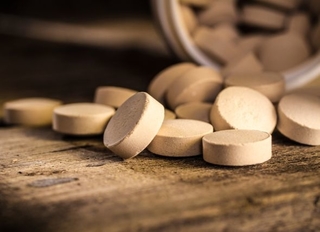Blog

Build Your Pet's Immune System with Beta - 1,3 / 1,6 Glucan
Saturday 27th November 2021
A malfunctioning immune system in dogs can open the door to a host of diseases, such as infection, diabetes, osteoarthritis, and cancer. Keeping your dog’s immune system balanced can help reduce these risks, and contribute to overall health and well-being, according to veterinary experts.
When this system is compromised, your dog may become increasingly vulnerable to illness. An immune system that’s off-kilter for an extended period can lead to chronic inflammation, which, in turn, can forge a path for disease. Diabetes, osteoarthritis, some liver and heart conditions, asthma, and cancer are just some of the diseases connected to inflammation, says Dr. Ken Tudor, a holistic veterinarian and founder of The Well Dog Place in Claremont, California.
What Is Beta Glucan?
β-glucans are a heterogeneous group of natural polysaccharides, consisting of D-glucose monomers linked by a β- glycosidic bond. They are important structural elements of the cell wall or serve as energy storage in bacteria, fungi including yeast, algae, and plants, while they are absent in vertebrate and invertebrate tissue. The individual glucose sub units are primarily linked either by (1,3)- β, (1,4)- β, or (1,6)- β glycosidic bonds. In most cases, β- glucans exhibit a uniformly constructed backbone of various lengths with side-chains of D-glucose attached by (1,4) -β, or (1,6) β bindings. glucans are able to modulate immune functions. These properties mainly depend on the primary chemical structure of the β-glucans.
However, not all β
Cellulose for example, a (1,4)-β-linked glucans, does not exhibit immune-modulatory effects. In contrast, β- glucans derived from fungi and yeast, which consist of a (1,3)- β linked backbone with small numbers of (1,6)- β linked side chains, are essentially known for their immune-modulating effects, are essentially known for their immune-modulating effects.
The use of Beta Glucan for human
Beta-glucans are taken by mouth for high cholesterol, diabetes, cancer, HIV/AIDS, high blood pressure, and canker sores. Beta-glucans are also taken by mouth to boost the immune system in people whose body defences have been weakened by conditions such as chronic fatigue syndrome; physical and emotional stress; or by treatments such as radiation or chemotherapy. Beta-glucans are also taken by mouth for colds, influenza (flu), swine flu, respiratory tract infections, allergies, hepatitis, Lyme disease, asthma, ear infections, aging, ulcerative colitis and Crohn's disease, irritable bowel syndrome, pain after surgery, fibromyalgia, rheumatoid arthritis, and multiple sclerosis.
How Does Beta Glucan Benefit Your Dog?
We know that beta glucan works well on the canine immune system. In fact, it actually works well in most animals. According to Dr Vetvicka, beta glucan might even be one of the oldest immune modulators or stimulators we know of
Beta glucan binds to and helps specific immune cells to coordinate an attack on their targets. Scientists refer to beta glucan as “biological response modifiers.” A modified response supports immunomodulation by preventing hyper-inflammation and an autoimmune response.
That means, when dogs eat beta glucan, it activates specific immune cells called macrophages. Macrophages target, trap and eliminate foreign substances that don’t belong in the body.
So, when you give your dog beta glucan his immune cells will become more active, more powerful and effective in attacking and consuming what doesn’t belong in his system. You’re giving him the ability to fight back against harmful invaders.
The use of Immunomodulators and Their Side Effects
Immunomodulators are a group of drugs that mainly target the pathways that treat multiple myeloma and a few other cancers. They have many ways to work, including working on the immune system directly by turning down some proteins and turning up others. The use of immunomodulators can be helpful in situations where immunity is impaired, because the modulation of the immune response could lead to an optimization of the body’s response.
Thalidomide (Thalomid), lenalidomide (Revlimid), and pomalidomide (Pomalyst) are known as immunomodulating drugs (or IMiDs).
These drugs can cause side effects such as drowsiness, fatigue, constipation, low blood cell counts, and neuropathy (painful nerve damage). There is also an increased risk of serious blood clots (that start in the leg and can travel to the lungs). These tend to be more likely with thalidomide than with the other drugs.
Immunomodulatory effects of beta-glucans for dogs
Beta-1,3/1,6-glucans are glucose polymers linked by beta-1,3 linkages with beta-1,6 side chains, and are recognized by their immunomodulating effects, through interactions with immune cells. They act by their interaction with specific receptors, leading to a modulation in the production of pro- and anti-inflammatory cytokines, which play a role on the immune cells’ functions.
In dogs, it was already proven that these compounds can modulate cytokine production, increase the functional activity of leukocytes and stimulate the production of antibodies. Recently, its benefits have also been proven in clinical situations, as an adjuvant treatment for atopic dermatitis, inflammatory bowel disease and osteoarthritis.
Final Thoughts
- Whether your pet is healthy or is suffering from a weak immune system, cancer, or diabetes, you should consider Beta-Glucan
- Beta-Glucan comes from a variety of natural sources, including cereals, fungi, yeast, and photosynthetic organisms that include algae and seaweed
- Beta-Glucan helps to activate Macrophages and eliminate foreign entities within the body
- You can add to your pet’s diet naturally, but can also find Beta Glucan 1,3 – 1,6 supplements;
- Talk to your veterinarian about the proper amount to give and if you have more questions.
Related Products
ImmunoDol Immune Support for Dogs Beta 1,3/1,6 Glucan
Dolvit Probiotic + Beta Glucan for Cats and Dogs
Dolvet Saccharomyces Plus for Cats and Dogs Vitamins, Minerals + Prebiotic + Beta-glucans
Dolvit Cayenne for Dogs Coprophagia
Dolvit Junior Plus for Dogs Vitamins and Minerals + Prebiotic + Beta Glucan
Multical Plus for Dogs Vitamins + Prebiotics + Beta Glucan
RodeVit Gastro For Rabbits and Rodents Gut Function and Digestion + Immune Support
References
NCBI
PetfoodIndustry
WebMD
PETMD
NOTE: The content on this website is not aimed at substituting veterinary advice, and information on products is not designed to treat, cure or prevent diseases. It is necessary to do your extensive research or consult your vet before giving any supplement to your pet.

